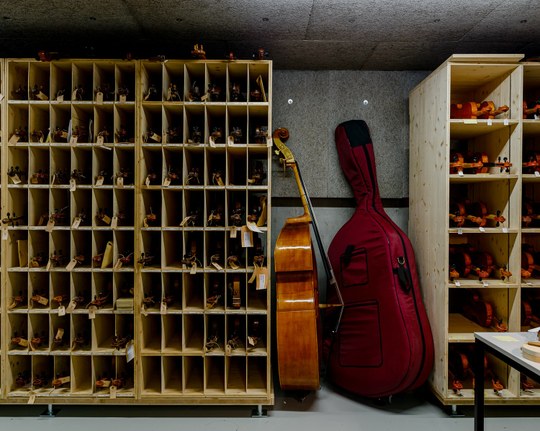A wide range of Citizen Science in Freiburg
Freiburg, Nov 23, 2023
“Creating knowledge with diversity” is the motto for the Forum Citizen Science 2023 taking place in Freiburg. The conference offers the community a platform for discussion, an opportunity to exchange ideas and network. The diversity described in the motto is already part of everyday practice at the University of Freiburg, which becomes obvious when looking at selected citizen science projects that researchers at the University of Freiburg are currently working on.

A view of a violin making workshop. Photo: Fabian Stransky
Exploring the world of violin making
Consider, for example, the cultural anthropologist Dr Sarah May, who is working on her habilitation thesis on wood and craftsmanship. A year and a half ago, she was approached by violin maker Janine Wildhage. The plan was for the two of them to research the training of violin makers together. Training is primarily characterised by several traditional violin making schools in Italy, France, Germany and Switzerland. However, future topics such as digitalisation are also playing an increasingly important role in this craft. May and Wildhage visited four schools as representatives. They are investigating the extent to which teaching and learning in European violin making is characterised by both traditional and innovative, future-oriented approaches. They are being accompanied by the photographers Sinah Osner and Fabian Stransky. “In this project, we don’t have the typically divided roles of researcher and ‘research subject’,” says May. “Janine Wildhage made the research possible in the first place with her expert knowledge. Sinah Osner, Fabian Stransky and she were involved in every step: from the research question to the on-site investigations and the editing of the final book.”
Mapping concepts with Cognitive Affective Maps
Michael Gorki and Dennis Schuldzinski from the Cluster of Excellence Living, Adaptive and Energy-autonomous Materials Systems (livMatS), together with Julius Fenn from the Department of Psychology, are using a new method to involve citizens more closely in research through Cognitive Affective Maps (CAMs). Similar to mind maps, respondents associate freely with a certain term. What do respondents associate with it? Which aspects influence each other? But another question is Do I rate an aspect positively or negatively? Unlike traditional questionnaires, CAMs do not specify any answer options. Instead, citizens are much freer in their associations and therefore have a greater influence on the research results. At the same time, the resulting networks are easier to analyse than in-depth interviews, for example. Fenn uses CAMs, for example, to record citizens’ perspectives on new technologies. Gorki is investigating what exactly people understand by the term sustainability. Both are fields of research that have a direct impact on the everyday lives of citizens and in which their voices are all the more in demand.
Working together for more biodiversity - the Exploratorium Lebendiges Wittental (Exploratorium Vital Wittental)
On a piece of university land outside Freiburg, the “Exploratorium Lebendiges Wittental” (Exploratorium Vital Wittental), forest entomologist Prof Dr Peter Biedermann from the Faculty of Environment and Natural Resources is investigating how biodiversity can be sustainably promoted with the help of relatively simple measures. To this end, Biedermann and his students are creating biotopes such as flowering meadows, ponds and stone walls that provide a habitat for insects, birds and plants. The research team is also keen to collaborate with the neighbours in Wittental who are able to visit the Exploratorium, enter into dialogue with the scientists and seek advice. It gives citizens the opportunity to learn how they can also contribute to biodiversity in their own backyards. At the same time, they give Biedermann new ideas and important feedback on how to win over the public in favour of species conservation. In the video, Peter Biedermann and project participant Sanne Bender show us their “Exploratorium Lebendiges Wittental”.
When is it actually “hot”? Citizens’ individual weather observations
Does 30 degrees Celsius always feel the same? And when is the sky still sunny or already cloudy? Geographer Rafael Hologa from the Faculty of Environment and Natural Resources is investigating subjective weather perceptions and therefore relies on citizens to document their own weather observations and thus provide insights into their subjective weather perceptions. A smartphone app allows them to easily participate in the crowdsourcing of data and share their own observations. Hologa then uses the data to find out, for example, under which circumstances official weather measurement data and subjective weather perceptions match - and when there are deviations. This knowledge helps, among other things, to plan the adaptation of cities to climate change more efficiently and to better communicate the social categorisation of weather events. In the video, Hologa and weather observer Alex talk about the project.

